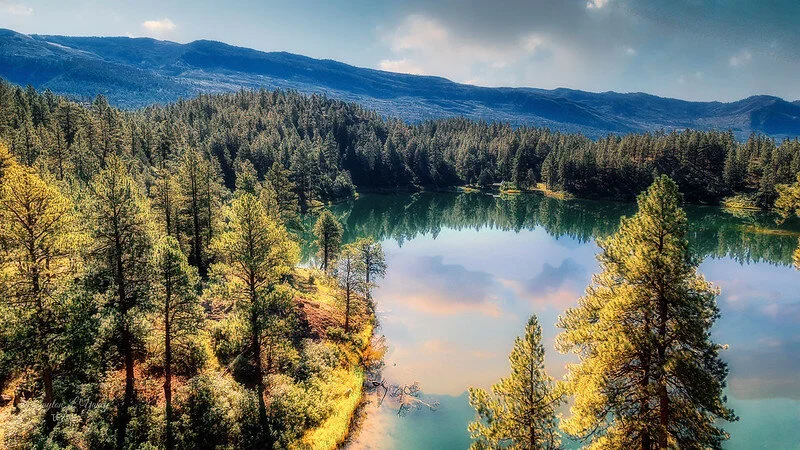Colorado Parks and Wildlife is promoting a new four-part educational video series on mountain lions. CPW Director Dan Prenzlow said this video series was produced to tell the history of the mountain lion and living with lions in our growing state. Click HERE for more information.
This summer, SJMA is offering several 5-day outdoor summer camps where kids will explore and learn about the natural world while making new friends and having a ton of fun. Click HERE to view the full calendar.
View RMFI’s 2020 Community Impact Report here!
The COVID-19 pandemic has had a significant impact on the state's budget. As a result, several grant programs managed by the Colorado Water Conservation Board have been impacted. View Budget Updates.
It’s time to buy your fishing license. Your license renewal does more than grant you the freedom to fish many of the state's beautiful lakes, rivers and streams. The revenue generated from your fishing license goes toward conserving your local fisheries today and for generations to come. The 2021 license year runs from March 1, 2021 - March 31, 2022 (13 months). Buy your license HERE.
The U.S. Environmental Protection Agency (EPA), Region 8, announced it entered into seven Safe Drinking Water Act (SDWA) Administrative Orders on Consent (AOCs) with its tribal partners between December 1, 2020 – February 12, 2021. Tribally owned or operated drinking water systems agreed to these AOCs to address violations of the National Primary Drinking Water Regulations to ensure public health protection in Indian country. Read the full press release HERE.
Invasive zebra mussels have been found in "Betta Buddy Marimo Balls,” a product sold at aquarium and pet supply stores in Colorado. Colorado Parks and Wildlife is asking stores to remove this product. If you have recently purchased this product and believe you may have a zebra mussel population in your aquarium, contact Colorado Parks and Wildlife's Invasive Species Program at 303-291-7295 for proper disposal methods.
Each year in January, Colorado Water Trust and the Colorado Water Conservation Board launch the annual Request for Water Process. This process offers a streamlined approach to water transactions to benefit rivers throughout the state. We invite water rights owners to explore options to use their water rights for streamflow restoration purposes. Click HERE to learn more.
SWEAP is gaining momentum thanks to individuals and organizations like you! Get involved in bringing water education to every community in Colorado by: Visiting the new SWEAP website | Downloading the SWEAP Executive Summary | Filling out a short form to share how you will bring SWEAP to your community and what resources would be most helpful | Signing up for email updates on SWEAP
Despite pandemic, Denver Water’s lead reduction program shows promising early results. Click HERE to read the full article.
Mountain Area Land Trust (MALT) is pleased to announce the completion of a Conservation Easement on the 71-acre Sacramento Creek Ranch located near Fairplay within MALT’s Red Hill to Hoosier Pass Priority Area! The Conservation Easement on Sacramento Creek Ranch will prevent the future subdivision of the property and protect critical open space and wildlife habitat for Elk, Moose, Black bear, Beaver and numerous other species that call this area home. The Colorado Natural Heritage Program has identified this region as having “Very High Biodiversity Significance." In addition to critical biodiversity protection, the Conservation Easement specifically ensures use of the property for public recreation, education and research purposes. If you are interested in visiting Sacramento Creek Ranch or learning more about the public uses, please send an email to malt@savetheland.org or call the MALT office at (303) 679-0950.
The Colorado State Forest Service (CSFS) has just recently released the 2020 Forest Action Plan (FAP), which is a road map to improving forest health across Colorado in the next decade. The 2020 FAP was created by forestry experts at the Colorado State Forest Service. This in-depth analysis of forest trends offers solutions and guidance for improving forest health and ensuring our forests — and the resources they provide — persevere for future generations. This plan will also help assist decision-makers in investing in our forests where these investments will make the most difference. If you would like to take a look at the plan please click HERE and HERE. Additionally, there is a Forest Action Plan app on the CSFS Forest Atlas page HERE. This is an easy, interactive tool that drills down into the themes of the Forest Action Plan and is an important tool to understand and know how to use. For CSFS and federal grants, partners will need to show where their project fits in relations to the FAP and will need to convey how the projects that they are proposing ties into this plan.
The Babbitt Center for Land and Water Policy, a center of the Lincoln Institute of Land Policy, proudly co-funded Swimming Upstream, a new StoryMap that highlights collaborative conservation efforts to protect endangered, native fish populations in the Upper Colorado River Basin and enhance critical streamflow management for recreation and agricultural needs in and around Grand Junction, Colorado, along a stretch of the Colorado River commonly known as the 15-Mile Reach. The StoryMap was developed by the Conservation Innovation Center for the Upper Colorado River Endangered Fish Recovery Program, in collaboration with the Colorado Water Conservation Board and the U.S. Fish and Wildlife Service. Click HERE to access the map.


